Philippine Interior Design Act of 2012: IRR and Practice Regulations
1/223
There's no tags or description
Looks like no tags are added yet.
Name | Mastery | Learn | Test | Matching | Spaced |
|---|
No study sessions yet.
224 Terms
Republic Act No. 10350
An act to regulate and modernize the practice of interior design in the Philippines.
Interior design
The science and art of planning, specifying, selecting and organizing the surface finishes, treatments, colour and materials including furniture, furnishings and fixtures and other interior design elements for the purpose of the interior space allocations to suit, enhance and meet the intended function, movement and character for which the interior of the building is designed.
Professional interior designer
A natural person who holds a valid certificate of registration and a valid professional identification card issued by the Board and the Commission pursuant to R.A. No. 10350.
Commission
The Professional Regulation Commission (PRC).
Commission Chairperson
The Chairperson of the Professional Regulation Commission.
Republic Act No. 8981
Professional Regulation Commission Modernization Act of 2000.
Board
The Professional Regulatory Board of Interior Design created under R.A. No. 10350.
Board Chairperson
The Chairperson of the Board of Interior Design.
CHED
The Commission on Higher Education.
CPE
Continuing Professional Education/Development.
CPEC
Continuing Professional Education Council.
AIPO
The Accredited and Integrated Professional Organization of licensed and registered Interior Designers recognized by the Board and the Commission.
CIDE
Council of Interior Design Educators.
Interior Space
An area inside a building or room with respect to design and decoration, the purpose, function and dimensions of which, is prescribed in the contract documents.
Contract Documents
Documents that form part of the legal contract for services between two or more parties which shall include detailed instructions to the contractor, tender forms, contract documents and specifications.
Objectives of the Rules
Govern the examination, registration and licensure of professional interior designers; the supervision, control and regulation of the practice of interior design; the development of the professional competence of interior designers through continuing professional education/development; and the integration of the interior design profession.
Statement of Policy
The State recognizes the important role of the interior design profession in nation building and promotes the sustained development of professional interior designers.
IRR
Implementing Rules and Regulations of the Philippine Interior Design Act of 2012.
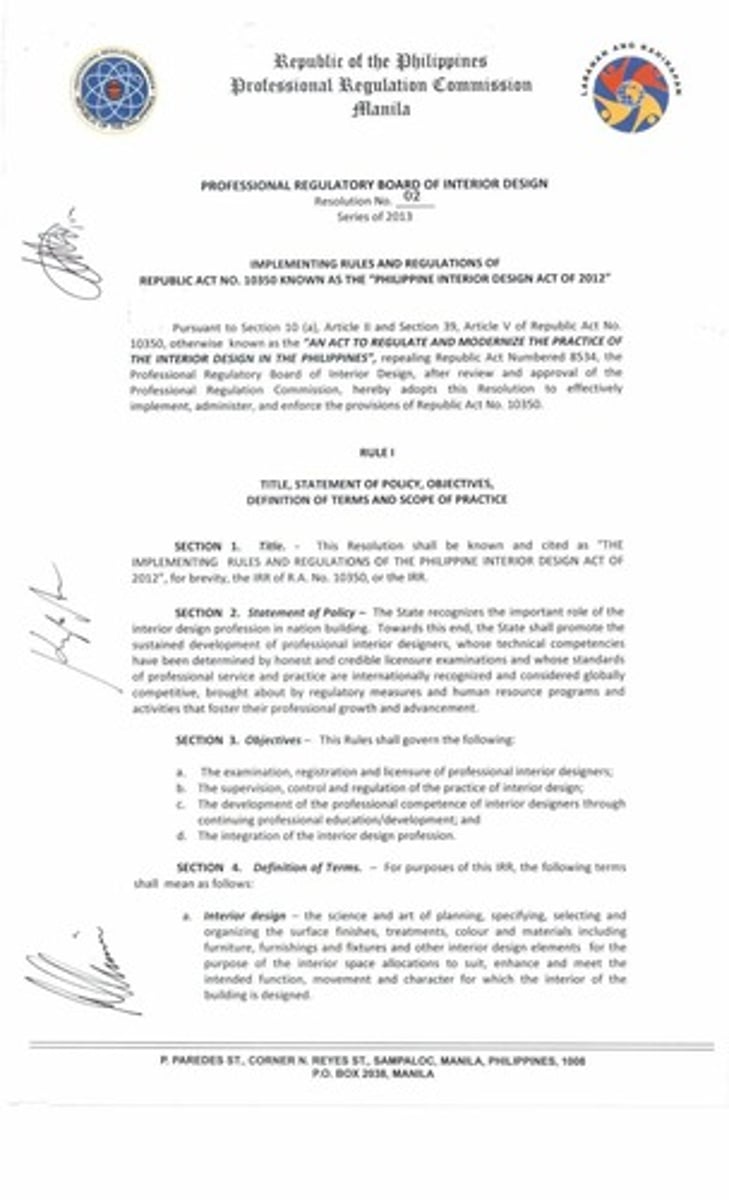
Professional Regulatory Board of Interior Design
The board responsible for overseeing the practice of interior design in the Philippines.
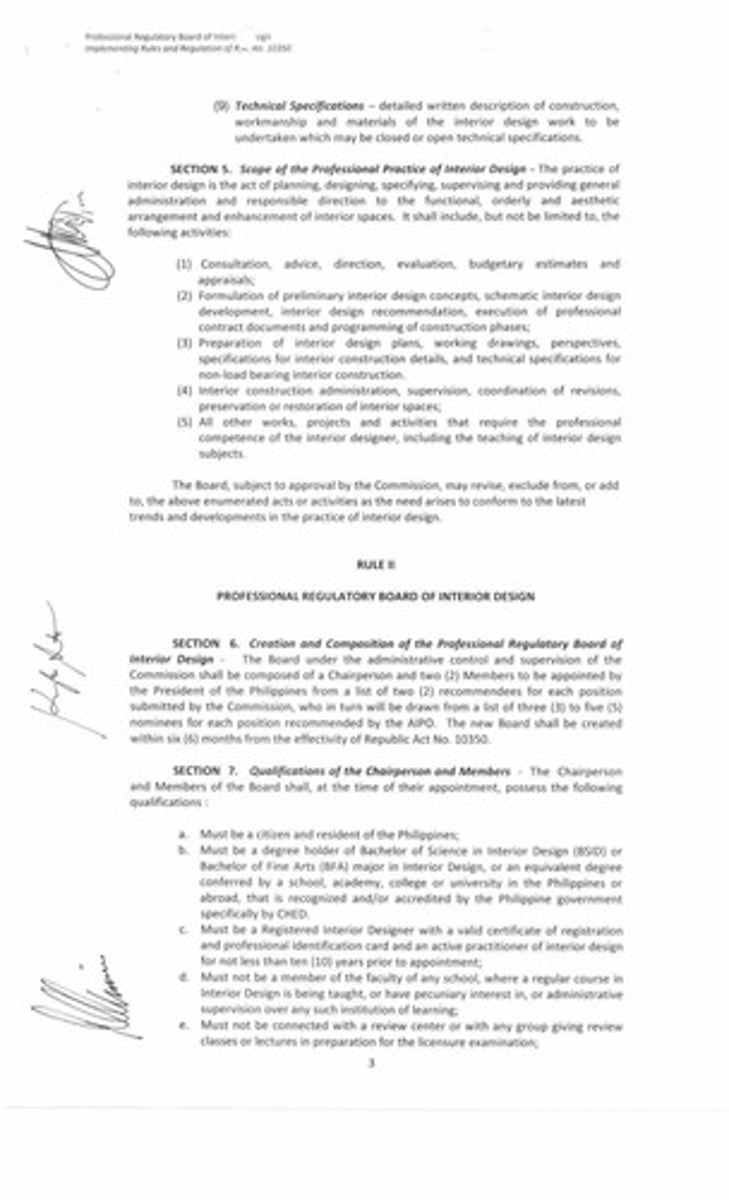
Resolution No. Series of 2013
The resolution adopting the implementing rules and regulations of Republic Act No. 10350.
Technical Competencies
Competencies determined by honest and credible licensure examinations for professional interior designers.
Internationally Recognized Standards
Standards of professional service and practice that are considered globally competitive.
Human Resource Programs
Programs and activities that foster the professional growth and advancement of interior designers.
Regulatory Measures
Measures that ensure the proper regulation of the interior design profession.
Interior Design Elements
Components such as furniture, furnishings, and fixtures that contribute to the overall design of an interior space.
Contract Administration / Project Management
services on specified interior spaces which shall include developing and monitoring schedules and construction costs, ensuring that construction is completed in conformance with contracts and design intent; or doing liaison works with contractors and consultants throughout the course of construction; reviewing shop drawings submitted by contractor; observing and monitoring construction progress; move-in and furniture/furnishing installations and conducting the required post-occupancy evaluations.
Furniture Footprint Plans
plans showing appropriate scale and type of furnishings with critical or required clearances that shall serve as the basis for a fully integrated project design for Furniture, Furnishings & Equipment (FF&E) package.
Furniture, Furnishings & Equipment (FF&E)
design, selection, specification, color coordination and procurement documentation of the required items necessary to meet the functional, operational, sustainability, safety and aesthetic requirements of the users.
Programming
scope of work which may include, but not limited to, conducting research; identifying and analyzing the requirements of the clients; evaluating existing documentation and conditions; assessing project resources and limitations; identifying life safety and relevant codal requirements; and developing project schedules and budgets.
Reflected Ceiling Plan (RCP)
a ceiling layout that shall include lighting and other fixed or movable elements of all utilities.
Space Planning
researches, analyses and plan/design translations of interior spatial requirements based on codal requirements and space planning standards, including, but not limited to space programs/plans, stacking diagrams, connectivity and access, satisfaction of organic and sustainable design requirements and furniture and equipment layouts.
Technical Specifications
detailed written description of construction, workmanship and materials of the interior design work to be undertaken which may be closed or open technical specifications.
Scope of the Professional Practice of Interior Design
The practice of interior design is the act of planning, designing, specifying, supervising and providing general administration and responsible direction to the functional, orderly and aesthetic arrangement and enhancement of interior spaces.
Consultation
advice, direction, evaluation, budgetary estimates and appraisals.
Formulation of preliminary interior design concepts
schematic interior design development, interior design recommendation, execution of professional contract documents and programming of construction phases.
Preparation of interior design plans
working drawings, perspectives, specifications for interior construction details, and technical specifications for non-load bearing interior construction.
Interior construction administration
supervision, coordination of revisions, preservation or restoration of interior spaces.
Chairperson
the head of the Professional Regulatory Board of Interior Design.
Members
individuals appointed to the Professional Regulatory Board of Interior Design.
Revisions
changes made to the interior design plans or specifications.
Restoration
the process of returning interior spaces to a former condition.
Supervision
the act of overseeing the execution of interior design work.
Coordination
the organization of different elements of the interior design project to ensure they work together effectively.
Functional arrangement
the organization of interior spaces to meet the needs of users.
Aesthetic enhancement
improvements made to the visual appeal of interior spaces.
Schematic interior design development
the process of creating initial design concepts and layouts.
Qualifications of the Chairperson and Members
Criteria that must be met by the Chairperson and Members at the time of their appointment.
Citizen and resident of the Philippines
A requirement for the Chairperson and Members to be a national and inhabitant of the country.
Bachelor of Science in Interior Design (BSID)
A degree required for Board Members, specifically in the field of interior design.
Bachelor of Fine Arts (BFA) major in Interior Design
An alternative degree qualification for Board Members in the field of interior design.
Registered Interior Designer
A professional who holds a valid certificate of registration and identification card, and has practiced interior design for at least ten years.
Ten (10) years prior to appointment
The minimum duration of active practice required for the Registered Interior Designer before being appointed to the Board.
Not a member of the faculty
A condition that prohibits Board Members from teaching in any institution where Interior Design is taught.
Pecuniary interest
Financial interest that disqualifies a member from being part of the Board.
Review center connection
A disqualification for Board Members if they are associated with any group providing review classes for licensure examinations.
Good standing
A status required for Board Members to be part of an accredited professional organization of interior designers.
Moral turpitude
A type of crime that disqualifies an individual from being appointed to the Board.
Term of Office
The duration for which Board Members serve, which is three (3) years.
Reappointment
The possibility for Board Members to be appointed again for another three (3) years immediately after their term.
Six (6) years limit
The maximum duration a member can hold office as Chairperson or Board Member.
Compensation of the Board Members
The payment and allowances received by the Chairman and Members, comparable to existing regulatory boards.
Powers and Duties of the Board
The responsibilities and authorities granted to the Board under Republic Act No. 10350.
Adopt, promulgate and administer rules
The Board's authority to establish and enforce regulations necessary for the implementation of Republic Act No. 10350.
Supervise and regulate registration
The Board's duty to oversee the licensure and practice of professional interior designers in the Philippines.
Administer oaths
The Board's responsibility to perform oath-taking in relation to the administration of Republic Act No. 10350.
Issue, suspend, revoke or reinstate certificates
The Board's authority regarding the professional licenses of interior designers.
Official seal of the Board
The emblem adopted by the Board to represent its authority.
Monitor conditions affecting practice
The Board's role in overseeing the practice of interior design and ensuring high professional standards.
Coordination with CHED
The collaboration between the Board and the Commission on Higher Education to ensure compliance with educational standards.
Code of Ethics
A set of principles guiding the practice of the interior design profession.
Administrative Cases
Legal proceedings involving violations of the Code of Professional Standards.
Subpoena
A legal document ordering a person to attend a court proceeding.
Subpoena Duces Tecum
A type of subpoena that requires a person to produce documents.
CPE/CPD Program
Continuing Professional Education/Continuing Professional Development program for Interior Designers.
Table of Specifications (TOS)
A document outlining the content and structure of examinations for Interior Designers.
Syllabi
The outlines of subjects for examination in the professional licensure examination for Interior Designers.
Professional Licensure Examination
An examination required for certification as a professional Interior Designer.
Grounds for Removal or Suspension
Reasons for which a Board Chairperson or Member may be removed or suspended.
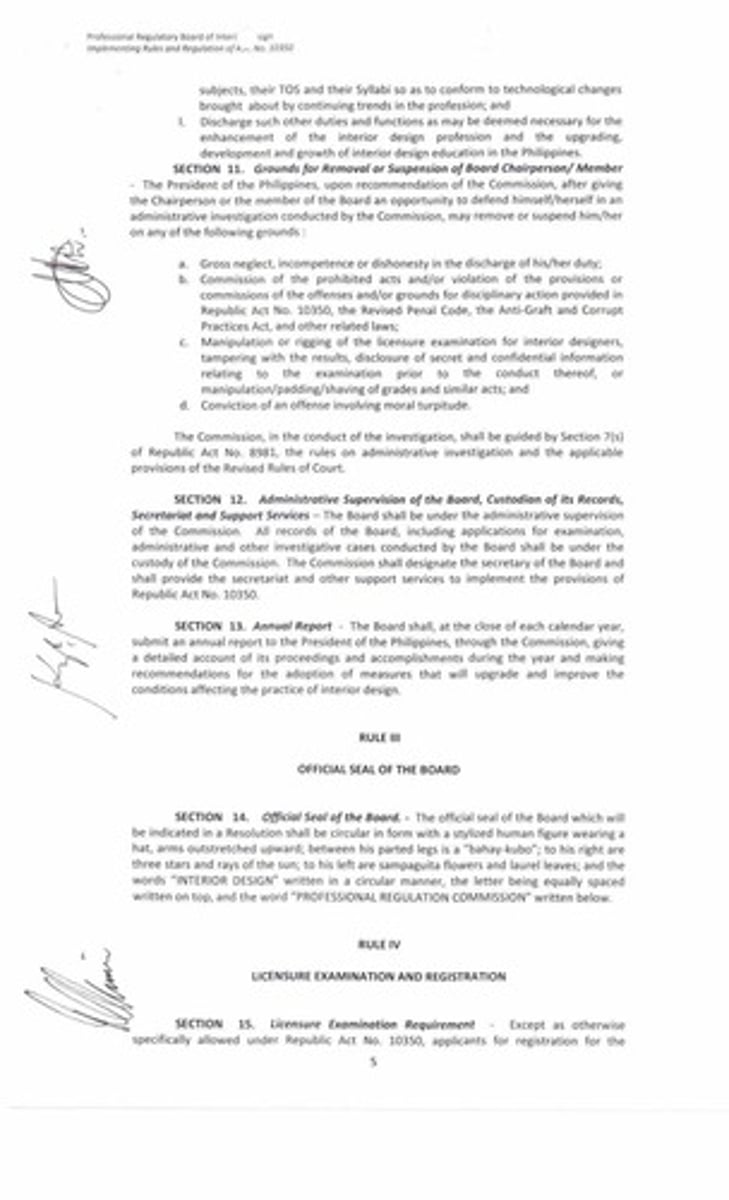
Gross Neglect
Failure to perform duties with the required care and attention.
Incompetence
Lack of ability or skill to perform duties effectively.
Dishonesty
Lack of integrity or truthfulness in professional conduct.
Prohibited Acts
Actions that violate the provisions of Republic Act No. 10350 and related laws.
Manipulation of Licensure Examination
Tampering with examination results or processes.
Administrative Supervision
Oversight of the Board by the Commission.
Custodian of Records
The entity responsible for maintaining the records of the Board.
Annual Report
A yearly summary of the Board's activities and recommendations.
AIPO of Interior Designers
The Accredited Integrated Professional Organization for Interior Designers.
Technological Changes
Advancements that affect the practice and education of interior design.
Licensure Examination Requirement
Applicants for registration for the practice of interior design must pass a professional licensure examination as designated by the Commission.
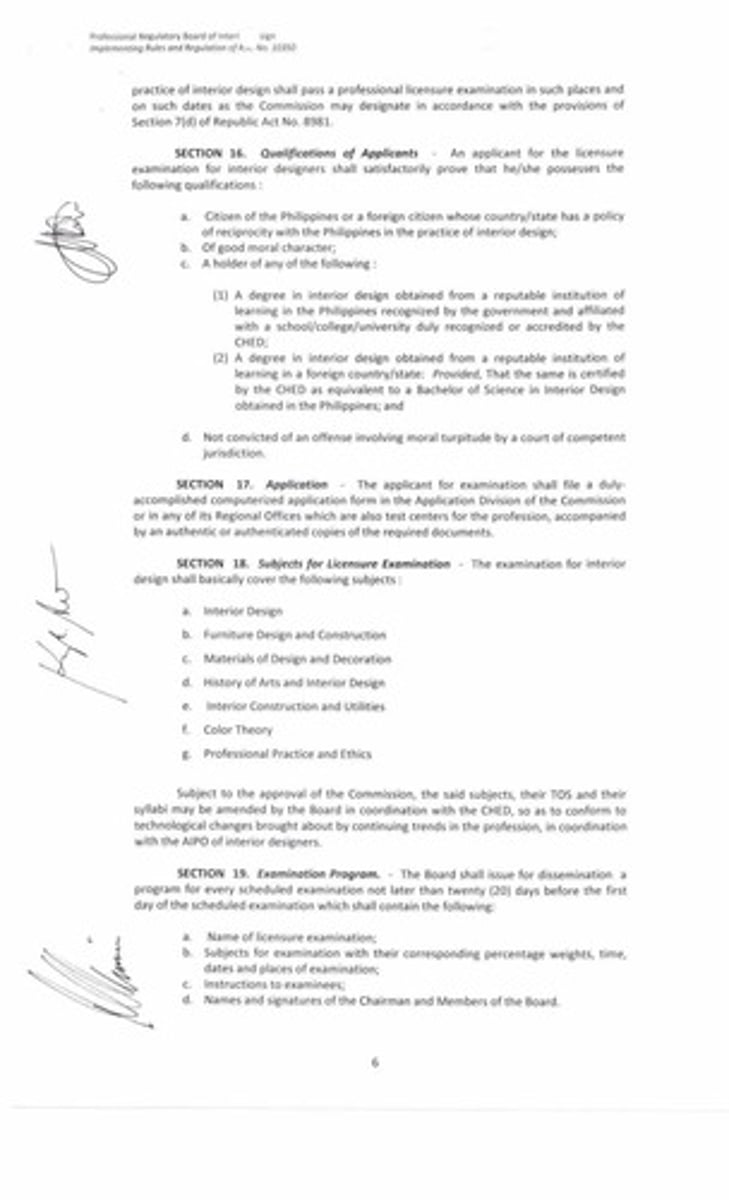
Qualifications of Applicants
An applicant must be a citizen of the Philippines or a foreign citizen from a country with reciprocity, possess good moral character, hold a degree in interior design from a recognized institution, and not have been convicted of an offense involving moral turpitude.
Degree in Interior Design
A degree obtained from a reputable institution recognized by the government or accredited by CHED, or a foreign degree certified as equivalent to a Bachelor of Science in Interior Design.
Application Process
The applicant must file a duly-accomplished computerized application form in the Application Division or Regional Offices, accompanied by authentic copies of required documents.
Subjects for Licensure Examination
The examination covers Interior Design, Furniture Design and Construction, Materials of Design and Decoration, History of Arts and Interior Design, Interior Construction and Utilities, Color Theory, and Professional Practice and Ethics.
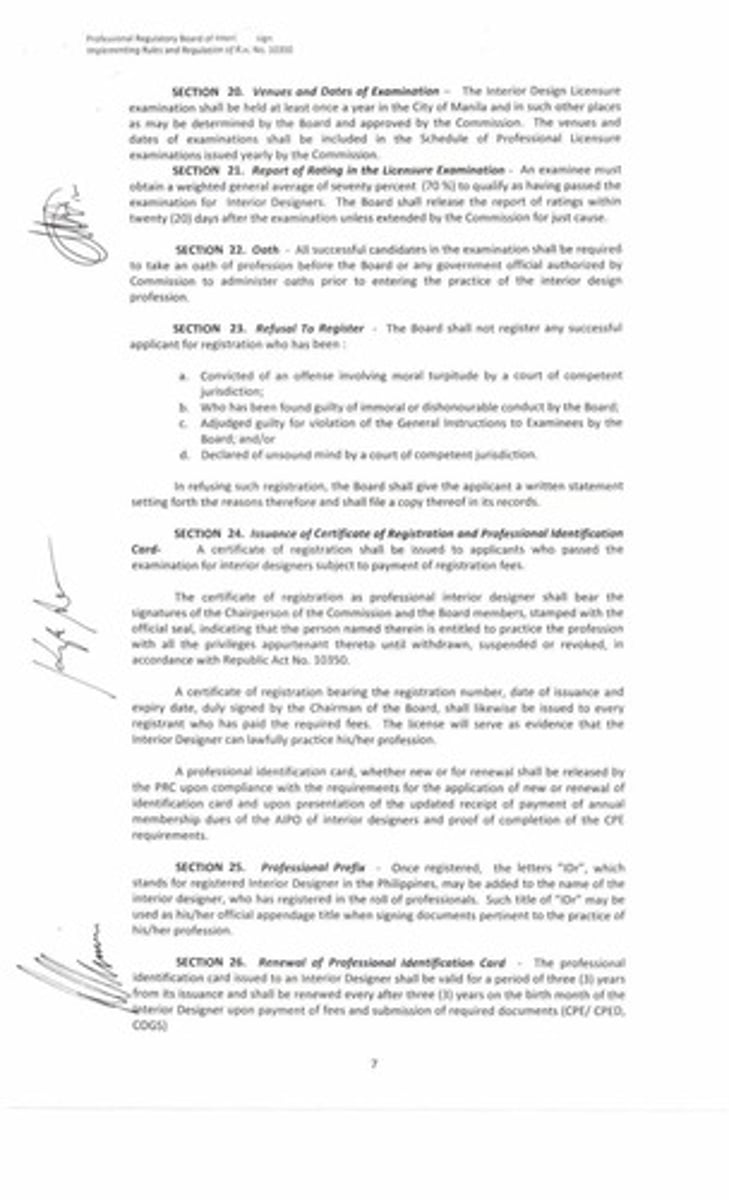
Examination Program
The Board shall issue a program for each scheduled examination at least twenty (20) days before the examination date, including the name of the examination, subjects with percentage weights, instructions, and signatures of Board members.
Venues and Dates of Examination
The Interior Design Licensure examination is held at least once a year in Manila and other approved locations, as listed in the yearly Schedule of Professional Licensure examinations.
Report of Rating in the Licensure Examination
An examinee must obtain a weighted general average of seventy percent (70%) to qualify as having passed the examination for Interior Designers.
Weighted General Average
The average score calculated by assigning different weights to various components of the examination.
Furniture Design and Construction
The process of designing and building furniture, considering both aesthetics and functionality.
Materials of Design and Decoration
The study of various materials used in interior design and their decorative applications.
History of Arts and Interior Design
An exploration of the evolution of artistic styles and interior design practices throughout history.